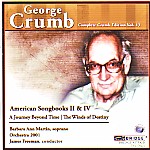A few years ago I had the great privilege (in cooperation with Becky and David Starobin of Bridge records) of presenting George Crumb with a “Lifetime Achievement Award” at the Cannes Classical Awards, which were held at the MIDEM trade show in France. After the ceremony there was a dinner for the honorees, and George quickly amassed a small band of young composer/admirers. One of these, anxious to display his avant-garde credentials, asked George who he personally enjoyed listening to, and rather presumptuously suggested a few of his own favorites as politically correct examples (led off–if memory serves–by the atrociously untalented Salvatore Sciarrino). George, gracious as always, just smiled gently and said in his inimitable West Virginia drawl: “Well now, I think Rachmaninov wrote some terrific tunes, don’t you?” The look of shock and confusion on his questioner’s face was memorable, to say the least.
More to the point, it says something significant about Crumb’s aesthetics: the ongoing validity and universal resonance that he finds in simple melody; his openness and eclecticism; his ability–as these “Crumbated” settings of popular songs show–to pour new wine into old bottles; and most importantly of all, the sheer joy he projects in composing. Whether happy or sad, serious, sentimental, or sarcastic, it’s impossible to listen to this music without concluding that Crumb had a great time making these settings and wants us to have an equally good time listening to them.
“A Journey Beyond Time” is a setting of Afro-American spirituals, including Swing Low, Sweet Chariot, Joshua Fit the Battle of Jericho, Steal Away, and several others. The reference to Rachmaninov above is apt: both composers show a preoccupation with the Dies Irae Gregorian chant, which here morphs effortlessly into a setting of Go Down, Moses. “The Winds of Destiny” is the larger of the two cycles included here, and it features some splendid settings of Civil War songs, including Mine Eyes Have Seen the Glory and When Johnny Comes Marching Home (with a wonderfully bitter, sarcastic third verse turned into a funeral march that actually quotes the chirping oboe descant from the third movement of Mahler’s First Symphony). There’s even an original “folk song” in the form of a setting of daughter Ann Crumb’s lovely poem The Enchanted Valley.
It was Ann Crumb whose original request for some song-settings from her father got the whole American Songbook project started, and who recorded Books I and III (magnificently) for Bridge. These performances by soprano Barbara Ann Martin, while very good, aren’t quite as special. Sadly, her voice has aged, and while she fearlessly tries to do everything Crumb asks, her basic tone under pressure turns shrill and a touch wobbly. She can be very moving, managing the requested “white tone” in Sometimes I Feel Like A Motherless Child most touchingly; but she can’t really summon a triple-forte shout in When Johnny Comes Marching Home, nor does she distinguish between the “softly spoken” and “stage whisper” phrases at the end of The Enchanted Valley. However, as long as the volume remains largely soft (as it often does), Martin still can sing beautifully: the final song in The Winds of Destiny, a haunting setting of Shenandoah, is unforgettable. Magnificent playing by the members of Orchestra 2001 and incomparably vivid engineering make this a release of major importance.
































